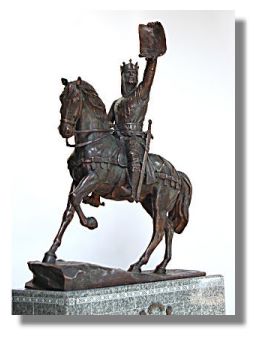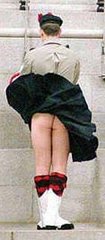 I know, I know, it's normally Celtophile Monday, but I've had a hand injury that's curtailed my online time severely. I'm a little behind. Three fingers of my right hand are taped together still, so typing is still quite the challenge!
I know, I know, it's normally Celtophile Monday, but I've had a hand injury that's curtailed my online time severely. I'm a little behind. Three fingers of my right hand are taped together still, so typing is still quite the challenge!
Here we go! All sources credited. Enjoy!
Site Chosen for New Bruce Statue
The newest statue to King Robert the Bruce, arguably Scotland's greatest monarch, is to be sited outside Aberdeen's Marischal College, surely the city's most eye-catching building. The design of the larger than life statue shows the monarch astride a horse and waving Aberdeen's charter. He granted this to the city 1319 in recognition for providing shelter to Bruce when he was deposed by the army of King Edward I twelve years earlier. The statue's design was voted for by the people of Aberdeen from a short-list of three sculptors. The successful submission was by artist Alan Herriot, who will be starting work on the statue later this year. It is expected to take a year to complete.
The Flying Scotsman!
Chris Hoy has made history at the Olympic games in Beijing by winning three gold medals in the cycling events. The Edinburgh athlete became the first Briton in 100 years to win three golds in the same Olympic games and the most successful Scottish Olympian - he also won a gold medal in the one kilometre cycling time trials in the Athens Olympics in 2004. When they return home, Hoy and other Scottish Olympic medalists and participants, who helped Britain to their best Olympic medal haul for 100 years, will ride in an open top bus down the Royal Mile in Edinburgh after attending a reception at the city's castle. Aberdeen canoeist David Florence was runner-up in the slalom, while rower Katherine Grainier also won silver (her third - she has won silver in three consecutive Olympics).
Edinburgh a World Heritage Site?
Recent approvals of major commercial developments in the centre of Edinburgh have caused concern at Unesco and the cultural body is sending a team of inspectors to Scotland's capital to consider its position as a "World Heritage Site". Key projects such as Caltongate (fronting onto the historic Royal Mile) and at Haymarket (where tall buildings will obscure views of the castle from some directions) have prompted the move.The inspectors will report next spring and will recommend whether Edinburgh is placed on Unesco's official "at risk" list of endangered sites.
Glasgow a City of Music
Scotland's largest city was this week named as a Unesco "City of Music" which recognises its "musical pedigree". Edinburgh citizens may regard Glasgow's pedigree as a bit of a mongrel, but the UN cultural body has put Glasgow on the same pedestal as Bologna in Italy and Seville in Spain. As part of its bid for recognition, Glasgow said it staged 127 music events a week, ranging from contemporary and classical to Celtic and country. The city can claim that it has given birth to many well-known musicians, particularly in the pop world, from Lulu to Travis, Franz Ferdinand and the Fratellis. The city is also home to the Royal Scottish National Orchestra and Scottish Opera.
Canadians Are World Piping Champs
The Simon Fraser University Pipe Band has been consistently placed in the top three in world competition in the last 25 years. Last Saturday the band won the Grade One World Pipe Band Championships for the fifth time, having just missed out on other occasions since their last win in 2001 - they have been placed second seven times in the last 25 years. The band is affiliated to Simon Fraser University in Burnaby, British Columbia, Canada (a suburb located just east of Vancouver). This year, Simon Fraser University band beat last year's winners, Field Marshal Montgomery from Northern Ireland into second place. Scotland's House of Edgar-Shotts & Dykehead were in third place.
Tracking Osprey
Two osprey chicks, setting off on their 3,000 mile migration to West Africa this month, have been fitted with satellite tags so that their progress can be followed over the coming months. The birds left the nest at the famous Loch Garten bird sanctuary for the first time in mid-July and have been spending the last month learning the finer points of flying and diving for fish around Strathspey. The two chicks have been named Nethy and Deshar after two local primary schools. You can track their progress via the web site at RSPB Osprey Tracking.
New Burns Collection
The University of Glasgow and Oxford University Press (OUP) are collaborating to produce the most comprehensive collection of the work of Robert Burns ever compiled. The work will start next year to coincide with the celebrations marking the 250th anniversary of the birth of Scotland's most famous poet. The Bard's work is being re-edited from scratch by a group of prominent academics - and it will take them 10 to 15 years to complete. Burns' songs will be part of the 10-volume collection but will also be showcased on a large web resource so that they are available to all.
Highland Historic Environment Record
A new Web site has been launched which contains information about tens of thousands of historic buildings, archaeological sites and finds dating from earliest prehistory through to the present day which can be found in the Highlands. Items range from buildings and prehistoric sites to rusting petrol pumps and wartime anti-tank defences. The complete Highland Historic Environment Record (HER) database is available on-line, along with thousands of linked documents and images. The public have been encouraged to flag up other sites of interest or add more information to those already featured. The online HER is fully searchable using the interactive map. There is also a wide range of other resources including themed articles and heritage trails. See her.highland.gov.uk
Dates in Scottish History
August 24 1482 - Berwick on Tweed finally ceded to England (Edward IV) after changing hands 12 times.
August 25 1930 - Actor Sean Connery born.
August 26 1875 - Novelist and statesman John Buchan born in Perth.
August 27 1784 - First balloon ascent in Britain by James Tytler, Edinburgh.
August 28 1296 - Edward I of England held a parliament at Berwick to which he summoned all Scottish landholders to sign the Ragman Roll.
August 29 1930 - Island of St Kilda evacuated.
August 30 1991 - Liz McColgan won the World Athletics Championship 10,000 metres in Tokyo by a margin of 20 seconds.
September 1 714 - Death of St Giles, patron saint of Edinburgh (and Elgin).
September 2 1834 - Death of engineer, road, bridge and canal builder Thomas Telford. He was buried in Westminster Abbey.
September 3 1745 - Prince Charles Edward Stuart proclaimed his father as King James VIII of Scotland at Perth.
September 4 1962 - Last tramcar run in Glasgow (to Auchenshuggle).
September 6 1715 - The Earl of Mar unfurled the standard of the "Old Pretender" in Braemar at the start of the first Jacobite Uprising.
Scottish Inventions - Speedo Swimwear!
Speedo Swimwear - Alexander MacRae (circa 1890-1935)
As we watched all the swimming events in the Olympic Games and the gold medals being won by the top athletes wearing "Speedo" swimwear, it is worth remembering that the company was founded by a Scot - Alexander Macrae. He was born around 1890 in Kyle of Lochalsh in north-west Scotland. In 1910 he emigrated from his home near Loch Kishorn to Australia. He was already married to a local girl and they later had five sons and a daughter. His wife died in 1925, giving birth to their only daughter. MacRae himself died on November 30 1938 - St. Andrews Day. MacRae established a company, MacRae Hosiery, in 1914 on Bondi Beach, Sydney, but changed the name later to MacRae Knitting Mills as he began to expand into swimwear. The brand name initially was "Fortitude" - taken from the motto of the clan MacRae. Its Racerback brand was one of the first figure hugging designs specifically created for athletes rather than just fashion - and covering up the skin. The name "Speedo" was adopted in 1928 after an employee, Captain Jim Parsonson, won a company competition with the slogan "Speed on in your Speedos". Always in the forefront of design and new materials - and powerful marketing - the company now dominates the sport.
(All of the above were from the Rampant Scotland newsletter)
Wales Medalists Welcomed Home
Ten Welsh members of Team GB took to an open-top bus tour and were greeted by a 2,000-strong crowd in Cardiff Bay. They included gold medallists Nicole Cooke, Tom James and Geraint Thomas and the swimmer and silver winner David Davies. First Minister Rhodri Morgan said Wales must also use the celebration to ensure the health of the nation improves. He said he had "never never imagined" over the 60 years he has been following the Olympics that Team GB would be so successful. The crowd waved Welsh dragon flags in front of the Senedd building, before greeting the bus after its short journey across Cardiff Bay with huge cheers. Read more
A History of the Welsh Language
Welsh is the oldest language in Britain. Its roots go back at least 2,500 and possibly 4,000 years. Click here
Irish Musicians Attempt World Record
Almost 3,500 musicians, singers and dancers gathered in Tullamore Aug. 22 in an attempt to set a record for the largest number of people playing traditional Irish music for 60 minutes. Click here
26 August 2008
Celtophile, er. Wednesday?
at
6:56 PM
![]()
Labels: celtophile monday, Scotophile Monday
Subscribe to:
Post Comments (Atom)





















No comments:
Post a Comment